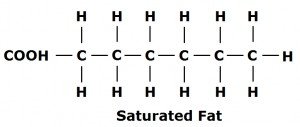The process of cooking always begins with an oil - lathered on a sheet pan or grill, swirled in a skillet, or tossed in a mixing bowl. The oils we choose can significantly impact the nutritional quality of a dish. Make sure you’re choosing the right oils each time you cook!
Background on Fats
All oils are made up of fatty acids - either unsaturated or saturated (sometimes a combination of the two). Most of us have been told that saturated fats are always “bad” and unsaturated fats are always “good”, but research is proving that’s not always the case, especially when it comes to the oils we use in cooking.
Unsaturated fats
These fatty acids have at least one carbon on the carbon chain that is unbound, meaning there is no hydrogen attached to it. There are two types: monounsaturated and polyunsaturated. Monounsaturated fatty acids have only one free carbon, while polyunsaturated have more than one. This difference in structure makes monounsaturated fats more stable at higher temperatures than polyunsaturated fats. It’s also what makes them both liquid at room temperature.
image credit: https://socratic.org/questions/what-is-the-general-formula-for-unsaturated-fatty-acids
image credit: https://socratic.org/questions/what-is-the-general-formula-for-unsaturated-fatty-acids
Both of these fats are typically considered healthy fats thanks to their cholesterol-lowering and anti-inflammatory effects, among other things (1). Most commonly, these types of fat are found in the following foods:
Olive oil, peanut oil, safflower oil, sunflower oil, canola oil
Nuts and seeds
Avocados
Fish and animal products
Saturated Fats
These types of fats have no unbound carbons - every carbon on the chain is bound to a hydrogen. This saturated structure makes these fats more stable than both unsaturated fats. It’s also what makes them solid at room temperature (think butter and coconut oil).
image source: https://socratic.org/questions/what-is-the-general-formula-for-unsaturated-fatty-acids
For years, we’ve been told that saturated fats are bad for us - that they are the greatest contributor to cardiovascular diseases, metabolic issues, and the like. However, scientists and researchers are discovering new evidence that saturated fats may not be all that bad. While they have been shown to increase LDL cholesterol (the “bad” cholesterol that can contribute to development of cardiovascular diseases), we cannot assume direct causation from correlation (2). Researchers are also discovering that this increase in LDL cholesterol in correlation with saturated fat intake cannot be identified as the sole contributor to heart disease and death associated (3).
Several studies have also been conducted to test the claim that all saturated fats are bad for heart health. Despite some mixed results and the need for continued research, we can conclude with confidence that not all saturated fats are always bad for our health. Saturated fats from certain foods like butter and red meat tend to increase the risk for heart disease and associated cardiovascular risks more than saturated fats from other sources like yogurt and coconut oil (3).
Saturated fats are found in foods like:
full-fat dairy, butter
red meat
skin-on meat and poultry
palm oil
coconut oil
When it comes to cooking…
We have to keep in mind that whenever we cook, heat is applied to the food and whatever else is in the pan, oven, bowl, etc., most importantly including the oil used. The structure of unsaturated fats - both mono- and polyunsaturated - makes them far less stable than saturated fats at higher temperatures. When these oils are heated, they are more susceptible to a process called “lipid peroxidation” - when free radicals attack the fatty acids and induce production of harmful compounds that can damage or even kill cells throughout the body (4).
Even a heart-healthy oil, like olive oil, is susceptible to this detrimental damage - and therefore so are we - when we cook with it at high temperatures.
So, which oils should we cook with?
At high temperatures (up to 450F): avocado oil, coconut oil, and ghee
At medium temperatures (up to 375F): extra virgin olive oil, sesame oil
Important Terms When Purchasing Oils
Extra virgin (applies to olive oil): this means the oil has been minimally processed in extracting the oil from the olive, which is good!
Refined: this means the oil has been processed to some degree, which could involve heat, chemicals, or other damaging methods. Usually this is done to reduce the flavor or odor of the oil (in the case of coconut oil). Not the healthiest term.
Unrefined: this means the oil has not processed using heat, chemicals, or other damaging methods. This is good! The oil may maintain a strong odor and flavor, which is usually overpowered by the dish and flavors it is cooked in, so it’s not usually a noticeable characteristic. It’s better than a damaged, harmful oil, anyway.
Expeller pressed: also “cold-pressed”; this means that the oil has been processed using only intense pressure and friction to extract the oil from the source, leaving the oil undamaged. Expeller-pressed, cold-pressed, and unrefined are often interchangeable.
My Favorite Oils
Primal Kitchen Avocado Oil (centrifuge-extracted)
California Olive Ranch Extra Virgin Olive Oil (cold-pressed)
La Tourangelle Organic Virgin Coconut Oil (expeller-pressed)
Oils to Avoid
any product without clear labeling of the processing (i.e. just “olive oil”)
canola oil, grapeseed oil, soybean oil, corn oil - these are most commonly processed with harmful chemicals and high heat
References.



